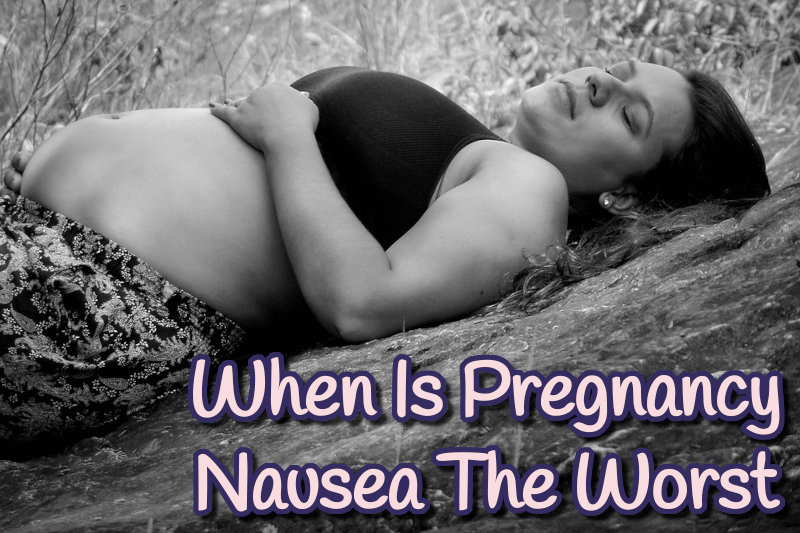Morning Sickness Fluctuation

November 13th, 2024 | Nausea, Pregnancy
Understanding Morning Sickness Fluctuation
Morning sickness, also known as pregnancy nausea, is one of the most common symptoms you may experience while you’re carrying. Interestingly enough, because it happens so early on, some women even find out that they’re pregnant by getting sick! Obviously, these symptoms are quite uncomfortable and can regularly leave you in a foul mood. As the baby develops, you may notice these symptoms getting worse, so you may ask yourself, “when is pregnancy nausea the worst?”
As you can imagine, each woman’s pregnancy is different. In other words, while some may experience pregnancy nausea regularly, others only suffer from it during the first few weeks. Luckily, there are ways to treat morning sickness, such as adjusting your lifestyle habits, changing your diet, etc. To be more prepared for your journey, we’ll look into pregnancy nausea, precisely its duration. Again, this is not a one-size-fits-all approach, but it will definitely give you some clarity on what you can expect.
When Does Pregnancy Nausea Start
Pregnancy nausea usually starts during the fifth week, when your body starts developing the so-called “pregnancy hormones”. It’s mainly characterized by queasiness and vomiting, but some women may experience retching as well.
The reason why morning sickness seems so severe at this time is because the hormones are produced rapidly in your body. Some may see this as a bad sign, thinking that it harms the baby, but it’s actually the opposite! Namely, all the sickness symptoms you experience during your pregnancy benefit your baby’s development. Also, although it’s called ‘morning sickness’, it can happen throughout any part of the day.
Now, you may wonder why some women opt for treating morning sickness even though it’s good for the baby. Well, if you take natural remedies for pregnancy nausea, this will only ease some of the symptoms and won’t affect the baby’s development in any way. With that said, you can freely take any of the products from our Preggie line, designed to ease your pregnancy journey.
When Does Morning Sickness Peak
While you may experience mild pregnancy nausea in the first few weeks, the symptoms may worsen as times go by. It is believed that morning sickness peaks around weeks 9 and 10 since the aforementioned hormones are at their highest level. During this time, you may get severely nauseous and won’t be able to keep your food down.
Naturally, this is quite an uncomfortable part of pregnancy. However, you should look at this as a positive thing! Namely, scientists believe morning sickness prevents toxins and other harmful foods from reaching the baby. Think of it this way – every time you experience pregnancy nausea, the body is doing its best to protect your little bundle of joy!
Does Pregnancy Nausea End
Luckily, yes, it does! Pregnancy nausea usually goes away around the 20th week, but some women may experience symptoms later than that. In some cases, morning sickness can last throughout the pregnancy, but this is rare. If you’re one of these women, we recommend informing your healthcare provider about the symptoms you’re experiencing.
Pregnancy nausea can be rather uncomfortable, but rest assured that it goes away. As for when, well, that’s up to your body to decide! Luckily, whenever you start feeling nauseous, you can always rely on our Preggie products – check them out!
Recent Posts
- Managing Chemotherapy-Related Anxiety: A Guide to Finding Your Strength
- Treat the Amazing New Mom: Self-Gifting Ideas for Postpartum Recovery
- The Overwhelming Reality: Why Support is Crucial After Postpartum & Chemotherapy
- Understanding Morning Sickness: Beyond the Myth
- Battling Nausea During Chemo Treatment: Tips and Strategies for a More Comfortable Journey
Categories
- All-Natural (4)
- Blog (47)
- Cancer (78)
- Diet (15)
- Holidays (27)
- Lifestyle (69)
- Motion Sickness (44)
- Nausea (106)
- New Mothers (41)
- Oncology Testimonials (3)
- Prebiotics (1)
- Preggie Products (11)
- Preggie Testimonial (24)
- Pregnancy (159)
- Queasy Products (7)
- Queasy Testimonial (17)